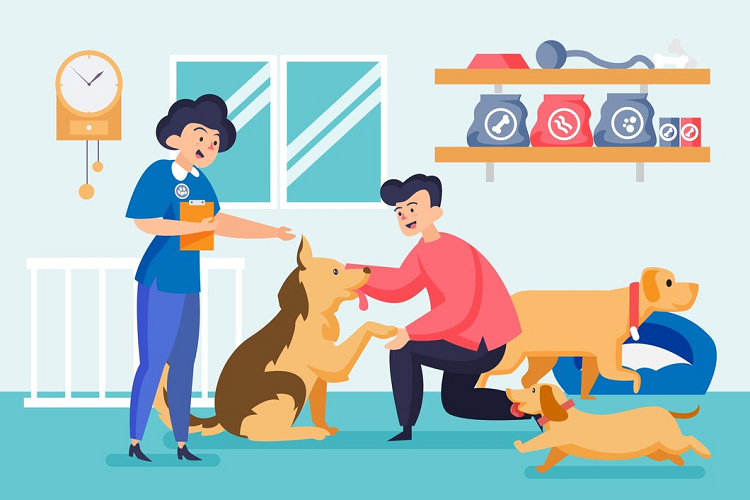Are you a dog lover looking to turn your passion into a profitable business? If so, starting a dog boarding business may be the perfect venture for you.
Pet industry tends to remain booming and lucrative because people just love their pets. Dog owners who travel for work or tend to work long hours need a safe place where they can leave their dogs, so doggy daycares and boarding businesses are popular.
If you love spending time with dogs and dream of owning a small business, opening a dog boarding or daycare business might be right for you. You will need to tailor what your business offers to what local dog owners need, and ensure that you will uphold only the highest standards of care. That is why we have put together a complete guide to starting your own dog boarding business.
Why should I start a dog boarding business?
During the pandemic, many people who were stuck at home adopted pets to keep them company. The problem is that when people returned to the office, their dogs had trouble adjusting to being left home alone all day. Even those who already had dogs at home got used to always having their person there and had trouble adjusting to the return to the office.
Dogs are creatures of habit, so once they become comfortable with something, it can be hard for them to accept a change to their routine. The demand for doggy daycares and boarding businesses has surged because of this; people do not want their dogs to be overly stressed by being alone all day while they are at work.
What are dog owners looking for in a boarding business?
To many dog owners, finding a dog boarding facility is essentially the same thing as looking for a new daycare for a human child, which is crucial for any budding entrepreneur to keep in mind. Let’s take a look at some of the features that your clients will be looking for:
1. Security Features
One of the biggest things that a prospective client will look for is the security features you offer. Any outside areas that dogs will be in need to be fenced off, and you need adequate fencing to help keep them in. This means something tall, so it is hard to jump, and not something they can easily climb or dig to burrow under.
You will also need to have security cameras, both inside and outside of the building. Clients may also want to see what emergency protocols you have in place in case of an emergency.
2. Transparent Policies
In general, people want to do business with a company that has clear and transparent policies in place, as well as clear pricing without hidden fees. Offering flexible drop-off and pick-up times is also another thing that clients will love, since sometimes they are just running late.
Having clear and transparent communication is also key, as well as offering dog owners regular updates on how their dogs are doing.
3. Trained Staff Who Care
Since you are working with dogs, your staff needs to be knowledgeable about dog behavior and care so the dogs you are taking care of receive adequate care. You also do not want to be caught short-staffed; make sure you have enough staff to manage the dogs who are staying with you.
If any dogs in your care are on medications, you will need to have at least a couple of people on your staff who know how to administer them and keep to the schedule that their humans have set.
Another thing you will need is access to an emergency vet in case anything happens. While having a vet as a member of your staff is convenient, you can partner with a local emergency vet and establish a relationship that you will take any dogs who need emergency care to that clinic.
4. Cleanliness
Cleanliness is key. Your business needs to be regularly cleaned and sanitized with pet-safe cleaning agents. You will also need pest control to keep fleas, ticks, and other things away from the dogs in your care.
5. Make the Dogs Comfortable
The dogs will need to have suitable bedding in your dog boarding facility as well as shelter. They also need temperature control and enough space to comfortably move around.
The dogs also need regular walks and playtime, as well as enrichment activities to exercise their minds. Giving them the opportunity to socialize is also important.
Many dogs have specific dietary needs that will need to be followed, and they need to be fed on a regular schedule.
Steps to Starting a Dog Boarding Business
Now that you have a better idea of what dog owners may be looking for in a dog boarding business, let’s take a look at what you need to do to start your dog boarding business.
1. Conduct Market Research
One of the first things to look into before you invest too much time or money into this idea is to research your area and answer these questions:
- Is there a demand for a dog boarding business in my area?
- Is there enough room in the market in my area for another dog boarding business?
- Are there any specialty services you can offer that will give you an edge over the competition?
You do not want to open up a dog boarding business if there are already several in your area because the market is saturated, and it can be hard to find clients.
Take some time to research your area and look into your competitors, the services they offer, and their pricing. Look at their reviews, see what their customers love and hate about them, and determine what you can do to fill in the gaps of where they might need to improve. You can offer your clients extra specialty services like grooming and obedience training, which can help open you up to additional clients and give you an edge over the competition.
When you conduct market research, talk to local rescues or vets and ask if there are any services that they think would be in the highest demand. Is there anything that they feel is missing from other dog boarding businesses that you can implement into your business?
2. Write a Business Plan
When you put your business plan together, there are a few things that you will need to consider when deciding how to structure your dog boarding business.
- Will you only be boarding dogs? Will you also allow cats?
- Are you running your business out of your home or a facility?
- Are you offering daycare or overnight boarding?
- What is the maximum number of dogs you can care for at once?
- Do you need to hire employees? How many?
As part of your business plan, you will need to know if you plan to run your business out of your home, rent a building, or buy one. While having a bigger building can be a little more expensive in the beginning, it may help you attract more customers. You also have to choose between buying an existing building or building a customer one from scratch. Building something completely new is more expensive, but if you get a steel building, it can be less expensive, it is eco-friendly, and you do not have to worry about things like mold and pests. Wherever you decide to open your business, make sure it is comfortable and big enough for the dogs in your care to be comfortable and have space to play.
Since part of the reason that you are creating your business plan is to help you get funding to launch, make sure your plan also includes how to plan to secure financing for the business. If you have any savings, or are looking into grants, or even crowdfunding plans, make sure you include them so that wherever you take the business plan when seeking loans, they know what is helping bring in your money.
3. Business Registration
You will need to register your business as a sole proprietorship or limited liability corporation (LLC). A sole proprietorship is owned and operated by a single person on their own. What is difficult with a sole proprietorship is that your personal and business assets are not kept separate. If you end up in a lawsuit, all of your personal assets — home, vehicles, money, etc. — can be brought into this.
An LLC keeps your personal assets separate from your business assets, so those are safe in the event of a lawsuit. There are some fees that are involved in registering an LLC that is not attached to having a sole proprietorship business.
Additionally, the tax structures between a proprietorship and an LLC are different. Take some time to determine which one will work best for you and your business.
4. Obtain Legal Documents and Insurance
Once you have determined what type of structure you want for your business, it is time to start gathering the legal documents that you need. This includes a business license, and any other licenses that your location requires for you to conduct business with animals. If you are building your facility from scratch, you will need building permits.
You will also need to obtain insurance for your dog boarding business. You will need general liability insurance, but it is also a good idea to look into getting professional liability insurance as well. Having professional liability insurance will help cover any injuries that happen to you, your employees, and the dogs in your care.
5. Supplies
There are a lot of supplies you will need to get to ensure you can run your business and keep the dogs and their humans happy. Some of the things you will want to have include:
- Food and water dishes
- Food
- Treats
- Kennels
- Bedding
- Toys
- Enrichment toys or games
- Waste bags
- Potty pads
- Animal first aid supplies
- Leashes and harnesses
- Grooming supplies if you plan to offer grooming.
- Cleaning supplies
- Fences to separate dogs when needed.
- Muzzles for aggressive dogs
A potential customer may want to tour your dog boarding business before they leave their pets with you, so having everything well stocked will show them that you are organized and have everything you need to keep their baby well cared for.
6. Hire Employees
If you are running your business out of your home and keeping it small to start out, you are going to need to have employees. You want to find employees who love dogs, have experience working with them, and can handle stress. The dogs in your care might need something from you overnight, so having a couple of employees who can work the graveyard shift is also a good idea.
If you have dogs staying at your business that are not well-trained, aggressive, or shy, you need to ensure that your employees are equipped to handle the situation. Look for people with hands-on experience, like volunteering at an animal shelter, frequently pet sitting, or even a regular dog walker. Since accidents happen, having someone on your team who knows how to administer first aid to dogs is also a good addition.
After you hire employees, you will need to get an Employee Identification Number (EIN) from the IRS. An EIN is what your employees will use when they file their tax returns at the end of the year. Once you have employees, investing in payroll software to simplify things for you is also a good idea.
7. Pricing
There are a lot of things that can be factored into your pricing, including the size, location, and competition. When you conduct your market research, make a note of their prices to determine what you can charge. The more services you offer, the more you can charge your clients. The size of your building can also be a factor in how high your prices are. When you first get started, it might be a good idea to set your prices lower than the competition to help bring in new customers. As you grow and establish your business, you can adjust your prices.
Another thing that you can consider bringing in more customers is to offer financing so your customers can make payments in installments. This can make your dog boarding business more accessible for people who might not be able to afford things otherwise. Offering this financing for either longer-term boarding or daycare can also help you take customers from your competitors. It is also helpful for people who need to leave town with little notice and cannot line up their usual pet sitter or cannot afford to board their animals while they are gone.
8. Marketing Your Dog Boarding Business
Once you are ready to open your doors, it is time to get the word out about your services. Digital marketing and search engine optimization (SEO) are essential, but it is also a good idea to go analog with your marketing. Contact pet stores, veterinary clinics, and even rescues to see if you can leave business cards and flyers with them. Print up flyers and hang them at dog parks or attend pet adoption events to pass them out to dog owners. You can even take out ads in your local newspaper or radio stations.
Final Thoughts
Starting a new business can be a daunting task, but if you love dogs, it can be a rewarding experience. Make sure you take the time to craft a thorough business plan, as it will be the key to financing, and it can help you build a strong foundation for your business. It can be difficult to start any business, but if you are a dog lover, then this may be the perfect business for you.
A. Burger is a freelance writer and an expert in faux stone and brick veneer and home DIY projects. She has a BA from Washington State University and has been writing and editing professionally for over a decade.




